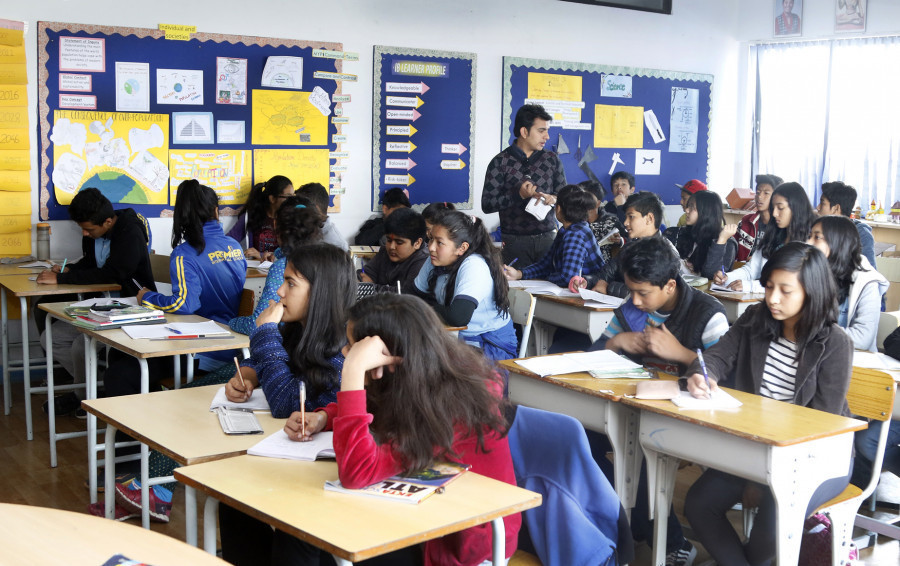Columns
Licensed teachers in private schools
It will provide quality services by deterring the entry of low-skilled human resources.
Simma Rani Rai
The neoliberalism policies implemented after the democratic change in the 1990s amplified the privatisation of education in Nepal. Private schools are independent schools that run without support or funding from the government. According to the Ministry of Education (MoE), enrolment in private schools nearly doubled at all levels between 2005 and 2010. With the popularity of private schools, the demand for teachers has also increased. However, these schools have not mandated a teaching license, which demonstrates qualification and professionalism, for their staff.
The 15th National Development Plan (2019/20-2023/24) recognises education as an important medium for the sustainable peace and prosperity of the country through an educated society. Considering this, a teacher holds a cornerstone position in assembling the development elements. Implementing a mandatory licensing system will create skilled mentors who will be the foundation for further skilled human resources.
Licensing is an authentic instrument recognised by law as a certification for reaching a standard quality. A teacher with a license will be recognised and trusted nationwide as it attests to their professionalism. Another benefit a license can provide is the safeguarding of their job. Having said that, private school teachers work more and are paid less. Some well-established private schools may pay high salaries, but there is no job security. A mandatory licensing strategy will highlight a teacher's crucial role in a knowledge economy while securing their respected position.
Quality assurance
Considering the weightiness of teachers’ influence in society, they should undergo certain pivotal assessments to determine their eligibility for the teaching profession. Like physicians or attorneys, teachers must procure a license so that the "consumer" is assured of the quality of the "product" being provided. Here, the consumers are the school students and teachers as the service providers. Private school chiefly runs on tuition fees. Hence, the students have every right to be taught by someone specialised in their vocation.
The annual report of the National Campaign for Education, 2015 shows that many teachers in private schools are untrained, or even if trained, most have only attended short courses inadequate for developing productive competencies or maintaining programme quality. To address this issue, a structured paradigm ought to be modelled. Currently, Nepal has no separate act for private schools alone enacted by the government. However, the National Centre for Education Development (NCED) has been conducting in-service teacher training programmes nationwide for those who aspire to become teachers. This training is conducted by Private Primary Teacher Training Centers (PPTTCs) affiliated with NCED. Such training and programmes will help in the refinement of their abilities and ready educators to emerge in pedagogical relations with young students.
Student performance
Private schools are a step forward in providing students with physical infrastructure. But the quality of education they provide should always be the component to scrutinise. The quality of the teacher determines the quality of the students, and the quality of the students in turn, determines the quality of the nation’s human resources.
Many studies have been conducted that show disparate results in student achievement taught by different teachers. A 2005 study titled “Does teacher preparation matter? Evidence about teacher certification, Teach for America, and teacher effectiveness” finds that certified teachers consistently produce stronger student achievement gains than uncertified teachers. Another study, “National Board-Certified Teachers and Their Students’ Achievement” conducted in 2004, identified teachers who passed the national board for professional teaching standards assessments are, on average, more effective teachers in terms of academic achievement. To reiterate, a licensing system will prompt better student achievement because the teacher knows how to handle students of different natures.
Eager partaker
Being a teacher means being dedicated to helping children buttress their present and future. A favourable outcome can only be obtained if the teachers are wholeheartedly attentive to their teaching. Thus, licensing scheme will help create passionate teachers.
A licensing system will provide services by deterring the entry of low-skilled human resources into the field. It has the potential to improve the average quality of teachers and create a competitive platform. Demanding higher teaching qualification standards have made teaching more exclusive and the profession more attractive to many. Requiring the candidates to pass the set standard would also certify that they deserve the profession.
Adopting a mandatory licensing system should be prioritised if we want to excel in the education sector. Education is the foundation of a well-enhanced and well-nourished population. Thus, the contributors of such vital sources–teachers–must be fully proficient in what they do. On that account, the education reform agenda will have a solid and reliable base if the licensing system is made obligatory.




 9.89°C Kathmandu
9.89°C Kathmandu















